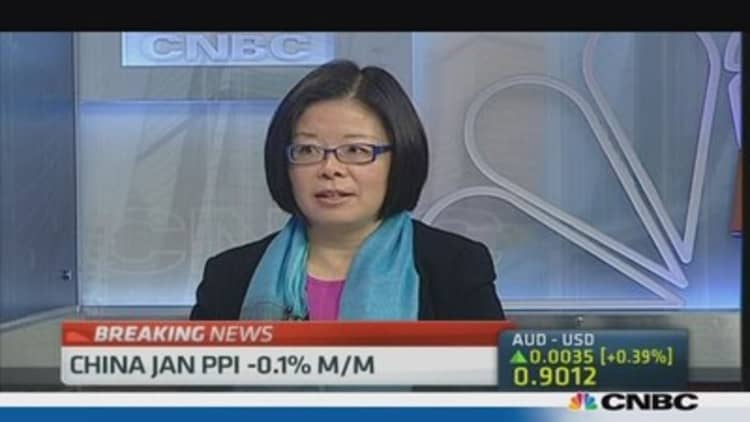Asian shares were mixed on Friday with Japan's benchmark index falling to a one-week low while the rest of the region gained on the back of subdued Chinese inflation data.
Chinese consumer inflation rose an annual 2.5 percent last month, but remained at a seven-month low, while producer prices fell for the 23rd straight month.
"This data out of China, to an extent, hit a sweet spot. Firstly, it shows price growth is tracking at a steady pace while at the same time subdued enough to leave the PBOC capacity to act if needed," said Stan Shamu, market strategist at IG.
For the week, the Shanghai Composite and Australia's were the region's top performers with gains exceeding 3 percent each while the underperformed with a 1 percent loss.
Nikkei tumbles 1.5%

Japanese stocks erased early gains to extend Thursday's near 2 percent decline, dropping below its 200-day simple moving average for the first time in a week, as dollar-yen fell below the 102 handle.
Comments by Finance Minister Akira Amari were unable to boost sentiment after he said most of the government's $53 billion stimulus package will be implemented by June.
Among the worst performers, Fast Retailing lost over 3 percent while Panasonic and Suzuki Motor fell 2.8 percent each. Kirin tumbled 9 percent after forecasting a lower-than-expected operating profit on Thursday.
(Read more: Japanese equities poised to pop: Pro)
Internet stocks were among the top winners. Social networking firm Mixi soared 19 percent after raising its annual earnings outlook and Yahoo Japan rose 3.7 percent following a stock upgrade from Goldman Sachs.
Shanghai gains 0.8%
China's benchmark Shanghai Composite rebounded to approach Tuesday's one-month high of 2,122 points after breaking its five-day winning streak on Thursday.
Lenders declined after data on Wednesday showed the non-performing loan ratio rose 1 percent to a two-year high in the fourth quarter. Minsheng Banking fell 1 percent while Bank of China inched down 0.4 percent.
Meanwhile, investors also digested news that the central bank issued rules to limit investment by wealth management products in bond markets in order to contain the growing risks from shadow banking.
Sinopec rallied over 6 percent after receiving government approval to produce biofuel from used cooking oil for the aviation industry.
Sydney up 0.7%

Australia's benchmark index jumped to a six-week high, breaking five straight weeks of losses. Meanwhile, the Australian dollar climbed back above 90 U.S. cents following the previous session's 1 percent decline.
Reserve Bank of Australia (RBA) Assistant Governor Christopher Kent said that if the currency is able to sustain a lower exchange rate compared to last year's levels, economic growth will see a boost.
In earnings news, the nation's biggest gold miner Newcrest Mining fell nearly 2 percent after a 36 percent decline in first-half profit and Rio Tinto closed flat following a 0.4 percent fall in its London-listed shares after the firm reported a 45 percent jump in second-half profit.
Sims Metal Management rose nearly 7 percent after returning to profitability in the first-half.
(Read more: Rio Tinto CEO: China aiming for resource security)
Kospi rises 0.7%
South Korean shares ended at their highest levels this month thanks to strong gains in automakers; Hyundai Motor and Kia Motors rose over 2 percent each.
Still, the benchmark Kospi has been trading below its 200-day simple moving average of 1,951 points since January 23.
Apple suppliers gained after the tech giant said that it found better working conditions across its suppliers' factories in its annual supply chain review. LG Innotek rose over 3 percent while LG Display rose over 1 percent each.
Emerging markets gain
Indonesia's Jakarta Composite finished higher by 0.3 percent while the rupiah soared to a more than two-month high against the dollar after the central bank kept rates steady on Thursday on a narrower current account deficit.
Indian shares tacked on 0.8 percent ahead of the closely-watched wholesale price index (WPI) later on Friday which eased to an eight-month low of 5.05 percent in January.
— By CNBC.com's Nyshka Chandran. Follow her on Twitter @NyshkaCNBC


